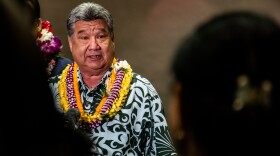Gov. Josh Green outlined where his priorities are through his biennium executive budget Monday afternoon.
In general fund costs, he has allotted $9.8 billion for fiscal year 2024, which begins July 1, 2023 and $9.6 billion in fiscal year 2025, which begins the following year.
This is a $667 million increase from the state’s previous budget.
As he promised during his campaign, Green is prioritizing spending federal aid, increasing social services, creating housing for the homeless and developing health care across the islands.
“We're going to have a lot of other priorities that go into the budget,” Green said. “We're going to have recommendations from the legislature, my directors are going to give their best recommendations to augment what they do, because we're gonna care about people.”
Since it’s such a quick turnaround from being first sworn in on Dec. 5, to having to present an executive budget, a lot of the basic work was done by former Gov. David Ige's administration — such as general housekeeping and operations.
The state is looking at a $2 billion surplus at the end of next fiscal year, but Green said that’ll likely shrink as the budget is tweaked, and plans, like how to tackle housing, are incorporated.
“We don't have additional resources yet on housing, because we're going to put together a comprehensive housing plan, which we hope to launch completely on or around the day that I'm asked to give the State address,” Green said.
He noted that the plan will incorporate $600 million of state Department of Hawaiian Homelands money and building more affordable housing.
To tackle the health care shortage, Green would like to expand loan forgiveness from doctors and nurses to social workers and school psychologists to hopefully create more allure for those in these professions to either move here, or make it easier to live here.
He’s proposing $10 million in fiscal year 2024, and then $20 million the next year, which would help offset loans and help these benefactors pay off their loans in about 5 years.
“Long term, we need to have doctors in each of the counties that are adequate to cover all the services and we have to support the hospitals that would otherwise really function and not require transport,” he said, noting that the state is typically short around 600 doctors 'at all times.'
"During the pandemic, we were 700 nurses short and we had to fly them in, it cost us like $70 million during COVID. If we just had enough nurses for far less money, we wouldn't have had to do that.”
While these last few years of the pandemic have taken a toll on the economy, federal dollars and continued tourism has put the state in a good spot.
This budget also releases a lot of money to up-keep or renovate schools, fund positions at the University of Hawaiʻi, and add $15 million to the state's ʻOhana Zones program for homeless services.
During his inauguration speech, Green spoke about wanting to cut the state's general excise tax on food and medicine.
“It's simply too expensive to live in Hawaiʻi. Right now, with inflation, it is doubly expensive,” Green said.







